Hugo Fernando Guerrero Sierra2
Martha Lucia Gallego Betancourth1
Melquicidec Parra Maca3
Bernardo Rafael Gil Rojas1

Mendive. Journal on Education, 22(4), e3953
Translated from the original in Spanish
Original article
Network for the internationalization of police education. Police education systems in Colombia, Honduras and Mexico
Red de internacionalización de la educación policial. Sistemas educativos policiales en Colombia, Honduras y México
Internacionalização da rede de educação policial. Sistemas de educação policial na Colômbia, Honduras e México
Gabriel Eduardo Guerrero Nieto1 ![]() https://orcid.org/0000-0001-8893-2475
https://orcid.org/0000-0001-8893-2475
Hugo Fernando Guerrero Sierra2 ![]() https://orcid.org/0000-0002-7280-1662
https://orcid.org/0000-0002-7280-1662
Martha Lucia Gallego Betancourth1 ![]() https://orcid.org/0000-0003-0486-8125
https://orcid.org/0000-0003-0486-8125
Melquicidec Parra Maca3 ![]() https://orcid.org/0009-0007-5939-252X
https://orcid.org/0009-0007-5939-252X
Bernardo Rafael Gil Rojas1 ![]() https://orcid.org/0000-0003-2346-4783
https://orcid.org/0000-0003-2346-4783
1Colombian National Police. Colombia. ![]() pipponba@yahoo.com; martha.gallego1092@correo.policia.gov.co;
bernardo.gil@correo.policia.gov.co
pipponba@yahoo.com; martha.gallego1092@correo.policia.gov.co;
bernardo.gil@correo.policia.gov.co
2La Salle University. Colombia. ![]() hfguerrero@unisalle.edu.co
hfguerrero@unisalle.edu.co
3University of Security Sciences. Mexico. ![]() melquicidec.parra70@hotmail.com
melquicidec.parra70@hotmail.com
| Guerrero Nieto, G. E., Guerrero Sierra, H. F., Gallego Betancourth, M. L., Parra Maca, M., Gil Rojas, B. R. (2024). Network for the internationalization of police education. Police education systems in Colombia, Honduras and Mexico. Mendive. Journal on Education, 22(4), e3953. https://mendive.upr.edu.cu/index.php/MendiveUPR/article/view/3953 |
Received: July 25, 2024
Accepted: December 5, 2024
ABSTRACT
This article corresponds to the result of research related to the objective of proposing guidelines for educational internationalization, within the framework of the Network for Internationalization of Police Education (RINEP), which allow quality assurance of police education systems. The study is exploratory, mixed, with concurrent triangulation, evidenced in hermeneutic units and descriptive statistical analysis, categories related to curricular internationalization, research, academic mobility and international accreditation, presented in semantic maps. Likewise, a comparative study of three police education institutions was generated as a sample of a population belonging to the RINEP of Colombia, Mexico and Honduras. For the collection of information, two semi-structured instruments, the survey and the interview, were designed and validated. Conclusions: internationalization among Police Education Institutions (IEP) makes it possible to strengthen curricula. It promotes academic production and its alignment with social projection, based on police science. Cooperation to facilitate the academic mobility of students, professors, researchers, managers and administrators for the formation of international competencies. Quality assurance of institutions and programs, within the framework of valid international standards specific to policing.
Keywords: higher education; police; quality; education; educational network; internationalization.
RESUMEN
El presente artículo corresponde al resultado de investigación, relacionado con el objetivo de proponer lineamientos de internacionalización educativa, en el marco de la Red de Internacionalización Educativa Policial (RINEP), que permitan el aseguramiento de la calidad de los sistemas educativos policiales. El estudio es de tipo exploratorio, mixto, con triangulación concurrente, evidenciado en unidades hermenéuticas y de análisis estadístico descriptivo, categorías relacionadas con la internacionalización curricular, la investigación, la movilidad académica y la acreditación internacional, presentado en mapas semánticos. Así mismo, se generó un estudio comparado de tres instituciones de educación policial como muestra de una población pertenecientes a la RINEP de Colombia, México y Honduras. Para la recolección de la información, se diseñaron y validaron dos instrumentos semiestructurados como la encuesta y la entrevista. Como conclusiones se encuentra: la internacionalización entre Instituciones de Educación Policial (IEP) posibilita el fortalecimiento de los currículos. Promueve la producción académica y su alineación con la proyección social, basados en la ciencia de policía. Cooperación para facilitar la movilidad académica de estudiantes, profesores, investigadores, directivos y administrativos para la formación de competencias internacionales. Aseguramiento de la calidad de las instituciones y los programas, en el marco de estándares internacionales validos propios de policía.
Palabras clave: enseñanza superior; policía; calidad; educación; red educativa; internacionalización.
RESUMO
Este artigo corresponde ao resultado de pesquisa, relacionada ao objetivo de propor diretrizes para a internacionalização educacional, no âmbito da Rede de Internacionalização do Ensino Policial (RINEP), que permitam a garantia da qualidade dos sistemas de ensino policial. O estudo é exploratório, misto, com triangulação concorrente, evidenciado em unidades hermenêuticas e análise estatística descritiva, categorias relacionadas à internacionalização curricular, pesquisa, mobilidade acadêmica e acreditação internacional, apresentadas em mapas semânticos. Além disso, foi gerado um estudo comparativo de três instituições de ensino policial como amostra de uma população pertencente à RINEP na Colômbia, no México e em Honduras. Para a coleta de informações, foram elaborados e validados dois instrumentos semiestruturados: a pesquisa e a entrevista. As conclusões são as seguintes: a internacionalização entre as Instituições de Ensino Policial (IEP) possibilita o fortalecimento dos currículos. Promove a produção acadêmica e seu alinhamento com o alcance social, com base na ciência policial. Cooperação para facilitar a mobilidade acadêmica de estudantes, professores, pesquisadores, gerentes e administradores para a formação de competências internacionais. Garantia de qualidade de instituições e programas, dentro da estrutura de padrões internacionais válidos e específicos para o policiamento.
Palavras-chave: ensino superior; polícia; qualidade; educação; rede de ensino; internacionalização.
INTRODUCTION
Higher education has been undergoing permanent and significant changes in line with new social dynamics. In this sense, Collins, Sidhu, Lewis and Yeoh (2014) argue that it is necessary to address current challenges resulting from the globalization of knowledge, in line with concepts such as cross-border, in attention to the competitiveness of markets in local and global scenarios, as well as coherence with guidelines for the commercialization of knowledge in the areas of education.
In this sense, higher education institutions (HEIs) have sought to adapt to these requirements, generating strategies to be attractive to their peers in the world geography. The academic offer must be continuously adjusted to current needs and projected to future societies, with flexible and diverse characteristics, supported by quality assurance systems, international recognition and other strategies at the national level, with intercultural, multicultural and pluricultural implications. Likewise, it is called to integrate outstanding actions in the internationalization of higher education, from substantive processes such as research, mobility of students, professors, researchers, managers and administrators, co-authorship of research, co-tutorship of degree works, double degrees, among multiple possibilities to strengthen the visibility and attraction of the international academic community.
Therefore, the research interest arose in order to promote the processes of internationalization and quality assurance in the IEP, especially those belonging to the RINEP, with support initiatives in the design of policies related to security and police education in the global context. This allows defining clear guidelines regarding the relevance and impact of the activity, aimed at achieving comprehensive and quality police training, providing a pertinent response to both local and international requirements in relation to criminal dynamics, which affect coexistence and citizen security, specifically from the police service. Likewise, the positive impact of the police graduate in the community and the generation of knowledge from the disciplinary police science are valued.
This is why the research question is posed, which is aimed at establishing: What should be the guidelines for educational internationalization within the framework of the RINEP as a proposal for strengthening police education systems? In this sense, and in order to provide the necessary tools and guidelines, it is intended to be based on both the human development of the personnel that integrates the institutions, and on generating contributions to the consolidation of the legitimacy and trust of the police forces towards the community, as well as on the strengthening of the competencies in police graduates for the solution of social problems in accordance with the functions of the positions, with a territorial focus and international references, as the case may be.
As a starting point, the theoretical approaches were taken within a conceptual, referential and theoretical framework specific to internationalization in higher education, highlighting aspects such as academic mobility, research linked to social projection, commercialization, good educational practices, and thoughts in Europe, Asia, Australia, North America and Latin America. Regarding internationalization, Altbach and Knight (2007) indicate the initiatives of institutions to monitor internationalization processes in order to guarantee quality and provide a relevant response to the requirements in higher education.
For the collection of information, a methodological route was proposed in which the perceptions of the academic community of RINEP were collected, as well as through interviews with the members responsible for strategic processes of the network. Subsequently, through triangulation, the results were established as a proposal for integration for continuous improvement and strengthening of quality in all levels of academic management. Similarly, for research within the reflection and research activities, codes and conceptual categories of internationalization in higher education were identified, under bibliometric parameters in specialized databases, especially Scopus.
The categories concerning curricular internationalization included characteristics related to double degrees, joint degrees, validation and homologation of academic credits, integration of credits, among others. Next, the internationalization of research, with joint academic production, internships, peer outreach, networks and publications. Academic mobility, especially for students, professors, researchers, administrators and managers, to strengthen intercultural skills. Finally, international accreditation, from the proposal of common standards with global recognition, certifications of good educational practices and the assurance of the quality of processes and institutional management.
Specifically, a comparative study was carried out to compare the doctrine and internationalization policies of the RINEP and three IEPs from the countries of Colombia, Mexico and Honduras, especially the National Directorate of Schools of Colombia (DINAE), the University of Security Sciences of Mexico (UCS) and the National Directorate of Police Education of Honduras (DNEP). In general, the research is mixed, under a "concurrent triangulation design (DITRIAC)", supported by the technological tool Atlas Ti, for the final analysis and interpretation.
López et al (2016) mention countless challenges, they constantly accompany the processes of formation, training and capacity building of police men and women today, in which they must respond appropriately in the attention and prevention of crimes and violations. Globalization brings with it transformations that encompass the economic, social, political and cultural dimensions of all countries, government entities cannot be left aside, where the police cannot be separated (Shishkin and Stukalova, 2015).
It seeks to glimpse and decipher reality, to achieve an understanding of social activities and their evolution, by consulting data related to politics, economics, habits, religion, among others (González-Monteagudo, 2000).
The research presented is a mixed method, as stated by Hernández, Fernández and Baptista (2014), it represents systematic, empirical and critical processes, involving the acquisition of quantitative and qualitative information, such as integration and joint discussion.
Caruso, Humboldt and Germany (2011) mention the most commonly used type of comparative study for social sciences, mainly in aspects related to education, therefore requiring relevant strategies, such as comparison, transfer, reception and constructs.
The scope was determined to be exploratory, related by Hernández, Fernández and Baptista (2014a), those that are determined to investigate a little-inspected research problem, and has not been done before, generating new visions of it.
In addition to the above, activities related to the collection, observation and analysis of premises of reality were included, in which police education is developed and how it is shown in relation to contemporary trends and the use of pertinent instruments that arise (Morales, 2003). This includes the mission development contexts of the agencies in charge of public security and, with it, training and capacity building. In this sense, police education must start from a permanent reading of the context, understanding the challenges in order to establish the vision relevant to the curricula.
Consequently, the power to conceptualize the results and reach final conclusions was established throughout the methodological exercise, the Concurrent Triangulation Design (DITRIAC), defined by Hernández, Fernández and Baptista (2014c), as a model for the researcher who tries to validate results and validate them from quantitative and qualitative information, taking advantage of the advantages and reducing their weaknesses. Triangulation was based on theoretical sampling, where the researcher establishes search measures based on the amount of information, where two or more research strategies are linked. For the presentation of the quantitative analysis of general categories related to internationalization processes, it is presented supported by the foundation under the amount of consulted, prevailed and characterized texts, where the experience as a researcher was used for the reflective and interpretive activity. The aforementioned, related to theory and practice, for the state of a reality subject to research, under a deductive judgment (San & Cantero, 2014).
Consequently, the objective of the article is to propose guidelines for educational internationalization, within the framework of the Police Educational Internationalization Network (RINEP), which allow for the assurance of the quality of police educational systems.
MATERIALS AND METHODS
For the development of the research, the interpretive paradigm was developed, where the objective of the research is focused on the processes of internationalization in higher education and its applications in the educational systems of the IEP, as significant characteristics in the dimensions of the organization and in the control of society, especially in relation to violations, crimes and the surveillance of coexistence and citizen security. This approach was based on qualitative interpretations, related to theoretical, referential and conceptual frameworks, with clear geographical delimitations and hermeneutic analytical notes, of the concepts of internationalization with the greatest impact.
Likewise, previously detailed semantic categories were used, as well as statistical data of foundation and density, such as the management of curricular internationalization, research, academic mobility and quality assurance of three IEPs from Colombia, Mexico and Honduras, together with the perceptions of the academic community of the RINEP. Subsequently, the results are triangulated, in order to comprehensively propose internationalization guidelines for police education systems for their comprehensive strengthening.
The above is justified by the scarce literature and concepts related to internationalization in police education systems. It has been necessary to analyze new approaches that have allowed expanding the categorical variables and their operational relationships in the universal context.
Combining the theoretical frameworks related to internationalization, the comparative study of the three institutions of the countries mentioned above and the surveys, where in the end guidelines related to internationalization for police education are proposed.
Methodological design
The research was developed in three phases, phase 1: started with the identification of the concepts of internationalization in higher education, of greater relevance in the national, regional and international spheres, applicable to police educational systems, the Scopus database was used, under the bibliometric formula of impact by consultation and citation index, in the consultation of scientific articles, books, theses and generalized information, with the premise of internationalization in higher education, in the world and Latin America.
In phase 2, it consisted of characterizing the doctrine on educational internationalization of the RINEP and, within the framework of the same, of three (3) police education institutions in Colombia, Mexico and Honduras, in terms of curricular internationalization, research, mobility and quality assurance. Comparative study, under the characterization of the internationalization processes, good educational practices, doctrinal documents, quality assurance, application of support with semi-structured instruments such as the network survey, in support of strengthening the concepts.
In phase 3, the set of processes that are part of the internationalization of police education was defined based on the conceptualized theoretical foundations, the RINEP and the three police education institutions of Colombia, Mexico and Honduras. Based on the DITRIAC, in conjunction with all the specific objectives mentioned, supported by categorized hermeneutic units, with the use of the Atlas Ti technological tool.
Finally, the characteristics of internationalization in education that have the greatest impact and prevalence in police education systems were determined. As a result, recommendations were established to achieve internationalization applicable to police education systems, focusing on the IEPs that belong to the RINEP.
Selection of instruments for information collection: A semi-structured interview was used to collect information in order to identify the perceptions of the academic community that are active members of RINEP, mostly IEP directors, who lead the academic management processes and are knowledgeable about internationalization. This instrument was administered during the development of the event "V International Meeting of Police Education Directors" held in 2019. The results showed opinion concepts, in accordance with the network's lines of action in a descriptive way. This instrument was structured with the validation and review of expert judges, developed in four categorical lines of action, including Curricular Internationalization, Research Internationalization, Academic Mobility, and International Accreditation. Additionally, indicators were integrated to complement the perceptions in a comprehensive manner. According to the above, twenty-two (22) indicators were consolidated, supported by a rating scale from one (1) to five (5), with their respective qualitative interpretation and an open question to expand opinions, on a Likert rating scale.
Population: The population was composed of the thirty-eight (38) police education institutions belonging to the RINEP, the IEP of the countries of Colombia was established as a sample with the National Directorate of Schools (DINAE) of the National Police of Colombia, the University of Security Sciences (UCS) of the State of Nuevo Leon Mexico and the National Directorate of Police Education (DNEP) of the National Police of Honduras. The characteristics of internationalization were prioritized, from the doctrinal components, policies, curricula in the international components, academic mobility, research and quality assurance, level of attraction of the training, capacity building and police training programs. Regarding the survey, it was sent through a Google form by link to eighty (80) members of the network, of which forty-nine (49) responded, corresponding to 61.25% of the total population.
RESULTS
Regarding the main objective of the study, the survey was framed in achieving the assessment of the management and the scope of the lines of action of the RINEP, in order to establish the important characteristics in the assurance of the quality and development of the same, allowing to establish processes of internationalization and prospective vision for the strengthening of the academic police management of the IEP.

Fig. 1- Curricular internationalization category
In relation to the category of curricular internationalization, as can be seen in figure 1, it was established that 79% fully agree that the postulates related to this category are pertinent as a line of action for the network, 17% agree with the indicator, where homologations, double degrees, co-degrees, with peer institutions should be more evident, 2% respectively mentioned neither agreeing nor disagreeing and disagreeing. Where the need lies in strengthening the promotion and inclusion of intercultural competencies, as well as the socialization and documentation of good police educational practices, dissemination and belonging in the international face-to-face and virtual academic offer.
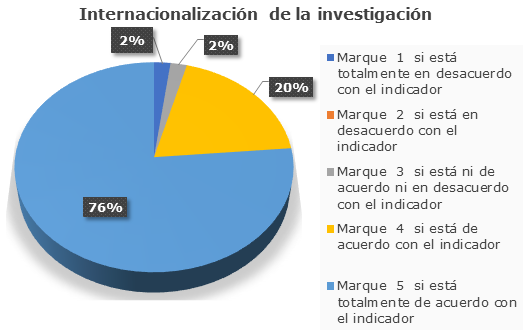
Fig. 2- Internationalization of research category
For the category of curricular internationalization, as shown in figure 2, it is established that 76% fully agree with the indicator, which shows that they are in agreement with what the network has defined. Twenty percent agree, and 2% respectively say they neither agree nor disagree and disagree. Therefore, it is considered important to strengthen the production of police knowledge by RINEP and its member institutions, around police science as a specific discipline. Likewise, they suggest the creation of a dissemination tool, such as a scientific journal for this organization.
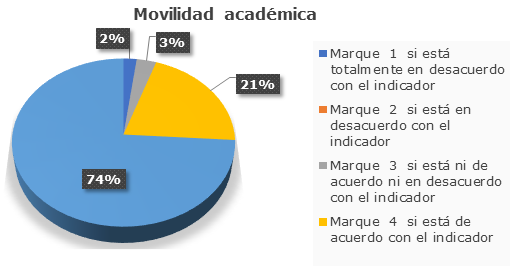
Fig. 3- Academic mobility category
The category of academic mobility, as shown in figure 3, relates results of 74% in total agreement with the indicator, being one of the most representative characteristics of the internationalization processes in the universal context and for the member institutions of the network, which is why it remains relevant in the consensus of the participants, likewise 21% agree with the indicator, where this mobility is necessary for students, professors, administrators, researchers and directors. Three percent consider themselves neither in agreement nor in disagreement, and finally 2% in total disagreement, a factor of special attention for the control and management of specific mobility indicators, for their dynamism and development; as well as the development of intentional actions for the strengthening of the substantive processes of higher education, training, research and extension.

Fig. 4- International accreditation category
Regarding the international accreditation category, as shown in figure 4, the academic community consulted stated that they were in agreement by 77%, reflecting the importance of the advances of the International Quality Assurance System (SIACEP) and the relevance of the quality assurance processes for the IEPs. Similarly, 17% stated that they agreed with the indicator, highlighting the need for international certification in good educational practices. Four percent remained neutral, neither agreeing nor disagreeing, and 2% stated that they were totally in disagreement, which translates into the need to appropriate and generalize a more consolidated self-assessment culture and unified quality systems.
For the total of the questions answered in relation to the forty-nine (49) people who were taken as a sample in the RINEP, 76% totally agreed with the activities carried out by the network, 18% mentioned being in agreement, 4% neither agreed nor disagreed and 2% totally disagreed (Figure 5).

Fig. 5- General results of the RINEP survey
In general, the results show an acceptance of the guidelines defined by the network, but at the same time, they do not show tangible processes of significant progress; where there is evidence of limited or non-existent measurement indicators for each of the lines of action, which allow, through a periodic systematic review, to contribute to decision-making, evidence in each IEP of the internal implementation of the internationalization processes. Clear proposals are made if possible the commercialization of the academic offer between the network and the institutions for self-sustainability, commitment to quality assurance from what was proposed by SIACEP and the increase of police peer evaluators with objective capacities for police educational systems, academic production with the relevant peer institutions and improvement for the police public service as a whole.
Analysis by RINEP, DINAE, UCS and DNEP categories
For the analysis results of the mentioned categories, the understanding of the processes of internationalization in higher education, in relation to three IEP of the RINEP, from the countries of Colombia, Mexico and Honduras. Results were established based on the strategy of semantic networks, established by the Atlas. Ti analysis application, allowing to interpret inductively and deductively the analyzed texts, Categories are shown in alignment with the network's lines of action, others that emerged in the researcher's reflection that are complementary, and seek to reinforce the concepts of internationalization.
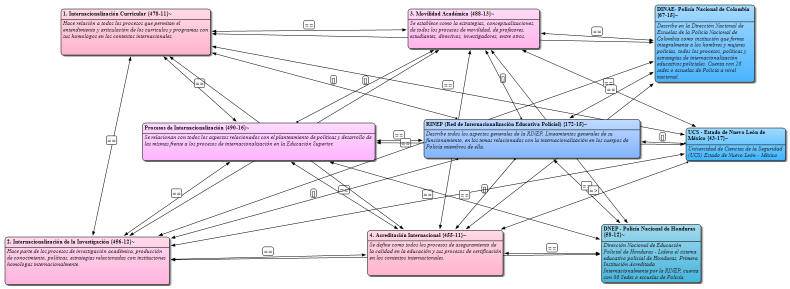
Fig. 6- Internationalization processes in Higher Education
As shown in figure 6, in general terms, in relation to the processes of internationalization in higher education, it is conceptualized based on the epistemology surrounding this factor and in its order with the four related categories. Internationalization is presented as the set of activities that facilitate the understanding and articulation of the curriculum and academic programs with peers or counterparts in cross-border or international scenarios, under the understanding of the credit system, evaluation system and study plans, research, mobility, among others.
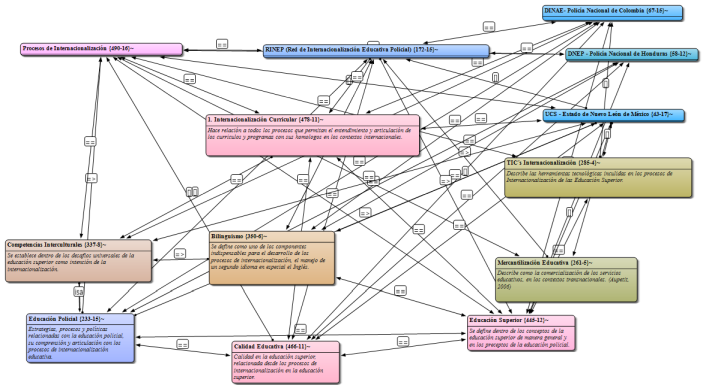
Fig. 7- Curricular internationalization category
According to figure 7, for curricular internationalization, assessing learning requires great challenges, so that when the measurement of learning levels is presented between cultures, finding a diversified academic community of students where the interest and objective are particular. The above requires creating differentiating parameters in the study plans, strengthening the dimensions of the fields and areas of knowledge. It has been used in many countries such as Europe and North America where they are founders in critical thinking and contribute to the current dynamics of the curricula, the Internet in the last ten years for the processes of internationalization.
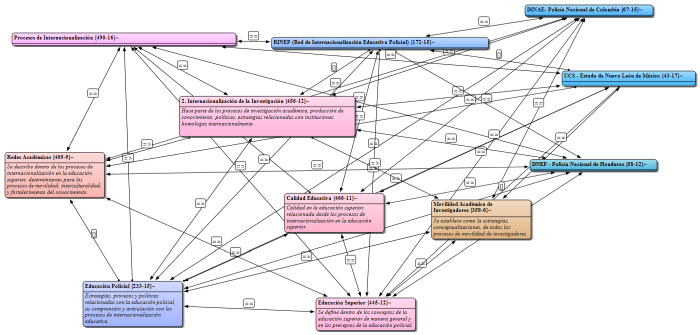
Fig. 8- Internationalization of research category
As evidenced in figure 8, in relation to the internationalization of research; it is evident that the generation of knowledge from educational spaces is essential for the contribution from the areas of knowledge, in relation to the relevance of the subject, specifically with police science from the disciplinary areas of public security activity, international cooperation is required for HEIs, to define scientific and technological policies, where it is allowed to promote and implement, in academic networks, active participation in networks to generate knowledge.
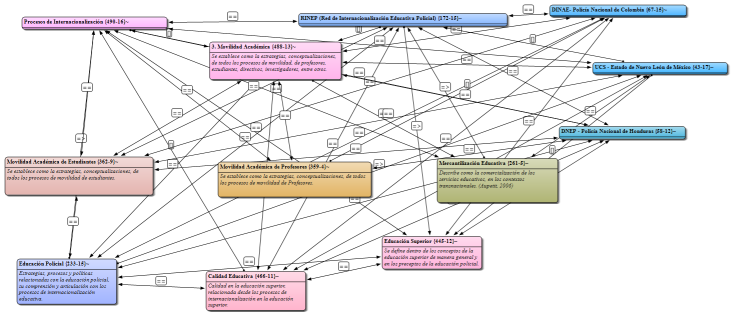
Fig. 9- Academic mobility category
According to figure 9, academic mobility concepts are based on the international academic community, represented primarily by students, in which social and economic factors converge for higher education institutions and the nations themselves. Characteristics corresponding to mobility give reason to advance credits with the obtaining of local titles or professional degrees abroad.
In relation to the IEP for comparison, some show more consolidated factors, especially the DINAE, which in compliance with the INL plan mobilizes, due to its experience, more groups of incoming students, teachers, administrators and directors for outgoing to advise and support the countries of Central America and South America. The UCS of security shows more consolidated processes at the national level of entry for mobility, but at the same time of exit in countries such as Colombia, the United States, Chile, among others. For the DNEP, this Central American institution, in the same way in the exit of students, administrators and teachers to countries such as Colombia, Russia, China, Panama, among others.
In its statutes, RINEP defines mobility as a line of action, in response to the globalized needs for promotion and encouragement, to strengthen the same intercultural skills that are also part of police training and education.

Fig. 10- International accreditation category
Finally, as shown in figure 10, international accreditation, necessary for quality assurance processes for educational institutions, it starts with structural components from the power to share successful experiences and good educational practices, policies, internationalization components, and coordinated organizational management systems. This concept grants privileges and connotations of competencies, for positioning, visibility, and positive impact on the local and international community. Where excellence marks the course of the institution, a commitment is required from the top down to the basic levels, as well as a representative budget and administrative allocation for its duration.
The RINEP designed the international certification strategy in good police educational practices, through SIACEP, with the DNEP being the first internationally accredited institution, sufficiently evidencing the significant development in police education, in relation to the dimensions of the police academic community, administration and academic management, the DINAE promotes in the same way from its twenty-four (24) accredited programs in high quality and the institution as such with this internal public recognition since 2012, for its part the UCS of security has the formality of its programs, at the date it is in the process of self-evaluation in order to achieve its international recognition.
These activities related to international accreditation, allow validations and special recognition that crosses borders, for programs and the institution, the unification of quality conditions for the IEP, are necessary in the unification of language and understanding in the police profession.
Quantitative analysis of categories
The presentation of the quantitative analysis of general categories related to internationalization processes, started from the experience as a researcher for the reflective and interpretive activity, in which theory and practice are integrated, for the state of a reality subject to investigation, under a deductive judgment.
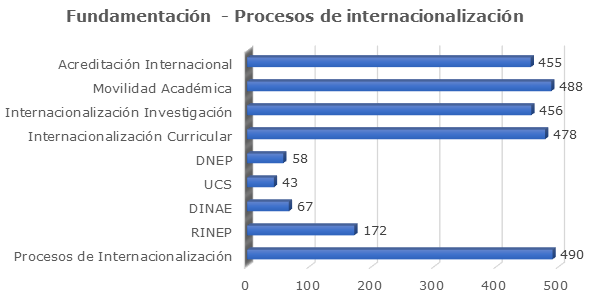
Fig. 11- Foundation category
According to figure 11, the global foundation for the internationalization processes in higher education is presented with 490 ninety categorized codes, an interpretation that responds to the relevance of the verified texts, focused as a strength for the administrative, operational structure and the action of teaching and learning, in the international sphere. Similarly, the RINEP with 172 digits, attending an alignment and response to the postulates of internationalization, based on its lines of action, the DINAE with 67 being the most representative institution and under clearer constructs in response to internationalization, in contrast to the UCS with 43, demonstrating a determining interest in being more involved in the global village, from its capabilities, with very significant evidence, the DNEP with 58 where currently, it continues to be a reference in the Central American region, for the advances in police education, internationally recognized and certified.
In addition, the curricular internationalization with 478, showing concern in the academic community, to continue positioning academic programs, generate and develop certification of intercultural competencies, double degree, homologation, among others. The internationalization of research with 456, reflects an epistemological base that contributes to the generation of cross-border knowledge, creation of networks, understanding between peers and evaluation systems, with special impact on society and conceptualizations of social projection. Academic mobility with 488 is distinguished by being the category of greatest universal recognition when it comes to understanding and justifying internationalization, where in contrast to the IEP subject of study and the network, they confirm this. Repeatedly, as necessary, almost obligatory activities, they frame quality in education, standards aimed at generating an environment of demand and the consolidation of educational management, especially in international scenarios, which is why international accreditation is presented with 455.
DISCUSSION
It is defined that internationalization in higher education compiles policies and their application in the mission fulfillment of institutions; in turn, contributions are generated to these little-studied processes. Aspects developed by researchers Altbach and Knight (2007) define that globalization and internationalization are closely related, without being the same definition. Globalization obeys phenomena such as the economy and academics of the 21st century, while internationalization complies with policies and activities opened by educational institutions, the academic community and systems to face the global academy.
De Wit and Merkx (2012), mentioned by Jamil and Martinez (2014), argue that in the 18th and 19th centuries, characteristics of internationalization in higher education could already be identified, including its diffusion, academic mobility and its offering in international settings. Regarding this dimension, its importance has been continually reiterated, even more so when it goes beyond local limits to be cross-border in this exchange of ideas, through seminars, conferences and publications. At the same time, research is considered a substantive function of higher education, facilitating the operation, positioning and visibility for the universal context.
RINEP, DINAE, UCS and DNEP seek to consolidate the internationalization processes and make their action visible in the global context. The lines of action related to curricular internationalization, research, academic mobility and accreditation show the actions that are carried out together with the thirty-eight (38) IEPs that comprise it, in unifying criteria to achieve results in the region in the strengthening of police education systems, with a positive and decisive local impact, based on best practices and external validations.
In this regard, with regard to the aspects that encourage educational internationalization, the opportunities advanced in trade, the acquisition of knowledge, the strengthening of the curriculum with international inclusion, supported by strategies such as operation in headquarters, cross-border cooperation, mobility and bilingualism, among others, are highlighted. These are necessary for the IEP, where the results showed an interest in strengthening bilingualism, especially in the English language, combined with academic production and the understanding of specific study plans of the police education.
Kehm and Teichler (2007) define an increase in research related to higher education activities in international contexts, with significant advances in theoretical and methodological foundation studies, although with little mastery. Likewise, the importance of characteristics such as mobility, the set of tasks for teaching and learning, academic production and the formulation of policies with gear for all levels is reiterated. It is necessary to continue to delve deeper into this type of research, especially in those countries that are not English-speaking. Based on the above, there are few studies that investigate issues related to internationalization in police education; many activities are developed automatically, making use of cooperation agreements or bilateral understandings, without an epistemological foundation in the police field.
Another aspect is based on considerations of the commercialization of international education and its expansion in economic spheres (Lörz et al., 2016). The research showed that, for the IEPs, the quantification and commercialization of educational services is important, in order to provide greater self-sustainability and generate other sources of income for the maintenance of police educational quality, from the academic offer, patents, registrations, rental of venues, consultancies, among others.
Academic mobility, in its most consolidated characteristic by the IEPs, is characterized in a special way for professional students, who are trained abroad or are received to advance academic studies. Next are teachers and administrators for the development of advisory or consulting services, and directors in referencing exercises. In the case of students, little mobility was evident, but with minor indicators that show important intentions. Rodríguez et al. (2016) establish an important impact on the same educational institution, on society and cross-border scenarios, in relation to policies, international accreditation and the mobility of teachers and students.
Finally, the RINEP and the three IEPs of the sample population defined for the research present few indicators of educational internationalization that allow the analysis of the impact of benefits or weaknesses of the same, in turn identifying continuous improvement, with poorly supported information being weak. Teichler (2015) relates that the information that rests on topics such as mobility in Europe, is due to foreign students, without any characterization of their own, under activities of participation in learning processes or academic in relation to research, with limited time.
The internationalization processes for police education represent a powerful academic strategy, with a great contribution to police professionalization anywhere in the world. Based on the above, it is necessary to increase the number of studies related to these concepts applied specifically to all levels that accompany police education, training and training.
The development of intercultural competences in police officers represents a basic need of the service in a globalized world, where criminality crosses borders and diversifies its action. Serious and committed processes are required from the curricula and in the intentions of academic mobility where students, teachers, researchers, administrators and directors participate, involving all IEPs in cross-border strategies and policies for the development of internationalization.
Likewise, academic mobility remains the most applicable and understood aspect of internationalization, especially in relation to students. When characterizing the concepts, the RINEP and the three IEPs of Colombia, Mexico and Honduras, this aspect continues along its line, which is why it is necessary to strengthen other fronts, such as curricular internationalization, internationalization of research and international accreditation for quality assurance.
With regard to the theoretical basis of internationalization, focused on police education, this must take into account the trend in global and Latin American contexts, especially those related to the dissemination and systematization of good practices, mobility, bilingualism (especially the English language), support for technology tools, internationalization of social projection, the generation of joint research products in scientific fields based on police science as a discipline for the public police service or areas of knowledge that complement it, and a relevant cross-border curriculum with support for the local and globalized police professionalization.
Internationalization must be defined in the policies of the IEP, since it requires structural and administrative alignment from the direction to achieve the objectives. There are many activities that are called international cooperation, which denote characteristics of the one that was the object of this research. These actions are developed bilaterally or for high-level political issues between states, in response to transnational crime, terrorism, drug trafficking, arms trafficking, cybercrime and human trafficking.
There is general acceptance of the RINEP's lines of action and its intentions, but little impact is evident, except for international accreditation, which advanced in the creation of SIACEP, with Honduras being the first institution to receive its international certification. Currently, twelve (12) IEPs are in the process of self-evaluation, affiliated with countries such as Argentina, Mexico and Spain. It is necessary to rethink and update the statutes of the network, given that it is five (5) years old, and thus prospectively establish better strategies for applying internationalization for police education.
It is also important to include as a line of action for the RINEP the internationalization of social projection, the connection with the global environment and the impact, together with the processes of research, academic development, mobility and quality assurance. This, as a response to the substantive functions of higher education in which the IEPs respond missionally, but are not doctrinally identified in the network.
As a result of the Covid-19 pandemic, it was necessary to adjust and rethink the paradigms in which police education is developed, taking teaching and learning with students and teachers to virtuality, where in-person presence prevailed or was not imagined. This demonstrates the ability to continue advancing in the design of strategies for the professional training of police men and women, and where internationalization opens up a wide range of possibilities for their development, allowing for the saving of resources and new possibilities for interaction with IEPs around the world.
Finally, the internationalization of police education promoted by the RINEP and by the IEPs on their own initiative has become an important strategy to unify concepts and join forces to achieve a consolidated and globally recognized professionalization of the police. The efforts directed at curricula, research, mobility, educational quality and social projection are a guarantee and paths for the members of the network to ensure its compliance and continuity.
BIBLIOGRAPHIC REFERENCES
Altbach, Philip G., & Knight, J. (2007). The internationalization of higher education: Motivations and realities. Journal of Studies in International Education, 11(3-4), 290-305. https://doi.org/10.1177/1028315307303542
Altbach, Philip G., Reisberg, L., & Rumbley, L. (2004). Trends in Global Higher Education: Tracking an Academic Revolution. En Biochemical Systematics and Ecology (Vol. 32, Número 12). https://doi.org/10.1016/j.bse.2004.04.006
Arias, M. (2000). La triangulación metodológica: sus principios, alcances y limitaciones.
Caruso, M., Humboldt, U., & Alemania, B. (2011). Teoría y metodología en estudios comparados: la justificación de un plusvalor y el abordaje de la globoesfera. Historia, 1, 1-2.
Collins, F. L., Sidhu, R., Lewis, N., & Yeoh, B. S. A. (2014). Mobility and desire: international students and Asian regionalism in aspirational Singapore. Discourse, 35(5), 661-676. https://doi.org/10.1080/01596306.2014.921996
González-Monteagudo, J. (2000). El paradigma interpretativo en la investigación social y educativa: nuevas respuestas para viejos interrogantes. En Cuestiones pedagógicas: Revista de ciencias de la educación (Número 15, pp. 227-246). http://dialnet.unirioja.es/servlet/articulo?codigo=625605
Hernández Sampieri, R., Fernández Collado, C. y Baptista Lucio, P. (2014). Metodología de la investigación. En Metodología de la investigación (Vol. 91). ISBN 978-92-75-32913-9
Jamil, S., Martínez, P., Nupia, M., & Téllez, F. (2014). Reflexiones para la Política de Internacionalización de la Educacion Superior en Colombia (August). https://www.cna.gov.co/1741/articles-186502_Reflexiones2014.pdf
Kehm, B. M., & Teichler, U. (2007). Research on internationalisation in higher education. Journal of Studies in International Education, 11(3-4), 260-273. https://doi.org/10.1177/1028315307303534
López, B. R. R., Reyes, J. G. C., Rojas, B. R. G., & Nieto, G. E. G. Importancia de la internacionalización educativa policial en la dirección nacional de escuelas. Escenarios pedagógicos: flexibilización curricular y empoderamiento del conocimiento, 75.
Lörz, M., Netz, N., & Quast, H. (2016). Why do students from underprivileged families less often intend to study abroad? Higher Education, 72(2), 153-174. https://doi.org/10.1007/s10734-015-9943-1
Morales, A. (2003). Los paradigmas de investigación en las ciencias sociales. ISLAS, 45(18), 125-135. http://josemramon.com.ar/wp-content/uploads/Gonzalez-Morales.-paradigmas-en-investigacion.doc
Rodríguez-Bulnes, M. G., Vences-Esparza, A., & Flores-Alanís, I. M. (2016). La internacionalización de la educación superior. Caso UANL. Opción, 32(Special), 560-582.
San, D., & Cantero, M. (2014). Teoría fundamentada y Atlas.ti: recursos metodológicos para la investigación educativa. Revista Electrónica de Investigación Educativa, 16(16), 104-122. http://redie.uabc.mx/vol16no1/contenido-sanmartin.html
Stukalova, I., Shishkin, A., & Stukalova, A. (2015). Internationalization of higher education: A case of Russian universities. Economics and Sociology, 8(1), 275-286. https://doi.org/10.14254/2071-789X.2015/8-1/21
Teichler, U. (2015). Academic Mobility and Migration: What We Know and What We Do Not Know. European Review, 23(S1), S6-S37. https://doi.org/10.1017/S1062798714000787
Conflict of interests:
The authors declare not to have any interest conflicts.
Authors' contribution:
The authors participated in the design and writing of the article, in the search and analysis of the information contained in the consulted bibliography.
![]()
This work is licensed under a Creative Commons Attribution-NonCommercial 4.0 International License